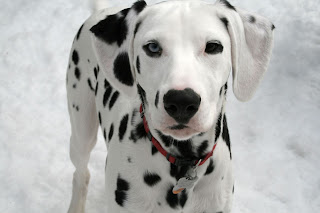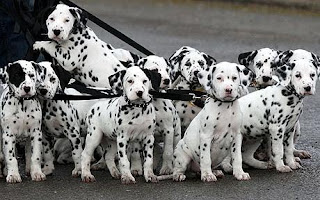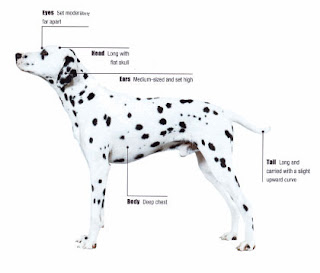
Dalmatian
Dalmatian is a breed of dog known from the white base color with black spots dibadannya. Brown color variations are also occasionally found, although much less frequently. Dalmatian name comes from the Croatian province of Dalmatia from the state, which is estimated as the origin of this type. The Dalmatian is better known as "Firehouse Dog" and the breed gained popularity after the Disney movie 101 Dalmatians.
- History Dalmation Dog
The origin of species Dalmatian dog has not been answered, but the evidence on the artifacts found there are many pictures dog with spots on his body, this shows Dalmatian has existed since ancient Egyptian times. From a lot of evidence and the story develops, Dalmatian is a dog that is known throughout the world with a black spot dibadannya.
Many also circulated the story that the Dalmatian is the guard dog and an opening and a guide dog so that the horse and his master to place the destination safely. Dalmatian therefore highly valued because it has strong power and never know tired.
- Characteristic Color of Dalmatian Dog
When a baby is born Dalmatian whole body is white. And the new spots will appear when the baby turns Dalmatian is 10-14 days. Spot still will continue to appear until the 3-month-old puppy. Dalmatian has two spot colors are black and brown liver. For black berspot Dalmatian in the nose and toenails must be black too. And contrary to Dalmatian berspot liver brown in the nose and nails must be dark brown.
A good spot on the Dalmatian dog is a medium-sized spot, not too big and not too small, +2-3 cm in diameter. Spread the good spots are evenly distributed on the entire body. And on the head, legs and tail, smaller spot size than in body.
Dalmatian eye color of black spot are dark brown, while the spot chocolate brown colored liver. The darker the color the better eye. It is also found in eye color blue, yellow and green on the Dalmatian at both eyes atupun one eye.
- Charateristics Of Anatomy Dalmation Dog
body length and height ratio of about 10:9
Dalmatian dog height of about 19-23 inches (47.5 cm -57.5 cm).
male Dalmatian dog, have 2 normal testicles.
on the head width. Location of the ear a little high and close to the head that support the increasingly visible form compact heads.
Nose solid black in color (the black spot) or dark brown (the brown liver spots.) Strong jaw with teeth scissor bite. Number of teeth total 42 units.
the neck long and sturdy and looks fine to goto the shoulder and connects with a smooth topline.
has a broad chest and deep, brisket reaching elbow forefoot chest. From the brisket back in a curve which regularly curved.
has a solid front straight and elbow while the hind legs and sturdy. Feet round and coarse and thick. Nails are white, black or brown depending on the color spot.ekor liver Dalmatian dog is not too high and not too low. At the time running tail raised slightly higher than the topline.
- Temperament
Loyal and always protect his master.
Always wanted to be close to his master and they will mengikutin go wherever his master.
Great curiosity and quite alert to the circumstances surrounding
They also like small children or other animals, but still needed supervision from someone more mature, because the Dalmatian are among breeds that have a great power that is feared will be hurt by accident.
They also are the breeds with high enough intelligence, quickly learned and clever, although sometimes they are a bit stubborn from the command master. (Processed from various sources / photo: special)
- Health
Like other breeds, Dalmatians Towards display a propensity to perform certain health problems. Hip dysplasia (the which affects only 4.6% of Purebred Dalmatians) is not a major issue in this breed. Most of Their health problems result from the onset of old age; the average Dalmatian lives Between 12 and 14 years, although cans Some live as long as 17 to 18 years. [8] In Their late teens, both males and females suffer bone May spurs and arthritic conditions. Autoimmune thyroiditis is a Relatively common conditions for the breed affecting 10.4% of dogs.
Deafness
A genetic predisposition for Deafness is a serious health problem for Dalmatians, only approximately 70% of Dalmatians having normal hearing. [10] Deafness was not Recognized by early Breeders, so the breed was thought to be unintelligent. Even after recognizing the problem as a genetic fault, Breeders did not understand the dog's nature, and Deafness in Dalmatians continues to be a frequent problem.
Researchers now know That Deafness in albino and piebald animals is the caused by the absence of mature melanocytes in the inner ear. This May affect one or both ears. Also The condition is common in other canine breeds That share a genetic propensity for light pigmentation. This includes, but is not limited to bull Terriers, Poodles, Boxers, Border Collies and Great Danes.
There is an accurate test Called the BAER test, the which cans determine if the defect is present. Puppies cans be tested beginning at five weeks of age. BAER testing is the only way of detecting unilateral Deafness, and reputable Breeders Their test dogs prior to breeding.
Only dogs with bilateral hearing Should Be allowed to breed although those with unilateral hearing, and even dogs with bilateral Deafness, make fine pets with Appropriate training. Research shows That Dalmatians with large patches of color present at birth have a lower rate of Deafness, and breeding for this trait, the which is currently prohibited in the breed standard, Might reduce the frequency of Deafness in the breed. One of the leading Reasons patches are a disqualifying factor in Dalmatians is to preserve the much prized spotted coat (the continual breeding of patched dogs Would result in Heavily patched Dalmatians with Few spots).
Research concludes That blue-eyed Dalmatians have a Greater incidence of Deafness Than brown-eyed Dalmatians, although an absolute link Between the two characteristics has yet to be conclusively proven. Though the blue-eyed Dalmatians are not necessarily deaf, many kennel clubs Consider blue eyes to be a fault or even a disqualification, and Some discourage the use of blue-eyed Dalmatians in breeding programs.
Hyperuricemia
Dalmatians, like Humans, can suffer from hyperuricemia. Dalmatians' livers have trouble breaking down the which cans of uric acid build-up in the blood serum (hyperuricemia), Causing gout; and cans be excreted in high concentration into the urine, Causing kidney stones and bladder stones. These conditions are most likely to occur in middle-aged males. Males over 10 are prone to kidney stones and Should have calcium intake reduced or take preventive medication. To reduce the risk of gout and stones, carefully Should owners limit the intake of purine by avoiding giving Their dogs food containing organ meats, animal by-products, or other high-purine ingredients. Hyperuricemic syndrome in Dalmatians responds to treatment with Orgotein, the veterinary formulation of the antioxidant enzyme superoxide dismutase.
Read more Health of Dalmation Dog.

Dalmatian Dog Breeds

Dalmatian Puupies
You have read this article dalmatian breeds dog /
dalmatian dog /
dalmatian dog picture /
dalmatian info /
dalmatian pets /
dalmatian puppies /
dalmatian puppy /
dog /
pet dogs
with the title Dalmatian Dog. You can bookmark this page URL http://kncatchat.blogspot.com/2011/04/dalmatian-dog.html. Thanks!













No comment for "Dalmatian Dog"
Post a Comment